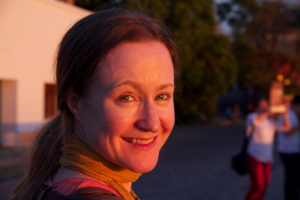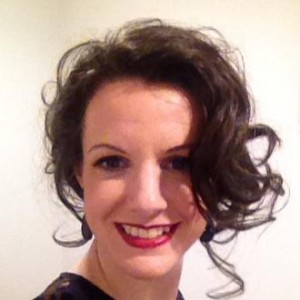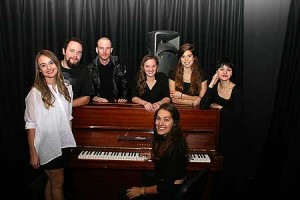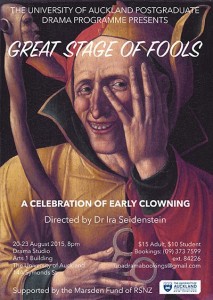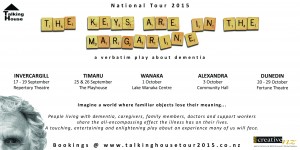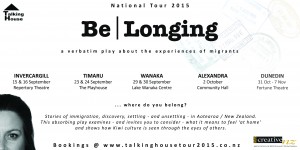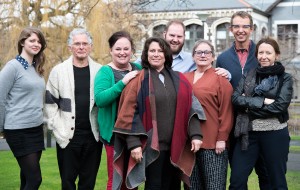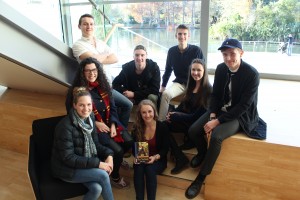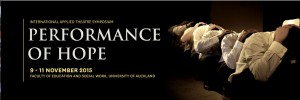Editorial
Welcome to the seventh edition of NUTS NZ – the Newsletter for University Theatre Studies New Zealand. The purpose of the newsletter is to help us communicate more effectively as a community of scholars interested in Theatre and Performance. We have an interesting selection of stories and news items for you in this 3rd issue for 2015. In this issue Dr. Sharon Mazer has kindly contributed a PBRF letter to help get us thinking and talking about how PBRF might impact on our discipline. We have included a short description of a Dramaturgy in NZ project that Dione Joseph is working on that should be of interest. We have details of a free public lecture that Prof. Helen Gilbert will be presenting at AUT on 1st of September. There are a few touring performances to take note of, in particular two verbatim theatre productions developed by Hilary Halba and Stuart Young, from the University of Otago’s Theatre Studies programme. Gaye Poole, Convenor of Theatre Studies at the University of Waikato, is also directing five projects in this half of the year. Another upcoming event to note is the International Applied Theatre Symposium, ‘The Performance of Hope’ hosted at the University of Auckland on November 9th, 10th & 11th.
We plan to circulate our eighth and final issue of NUTS NZ for 2015 in November, and we will need items of news by 30 of October. As always, submissions should be sent to the NUTS NZ editor Jane Marshall: j.g.marshall@massey.ac.nz
| Newsletter Issue | Information Required by | Date of Issue |
| Issue 8 | 30 October 2015 | 13 November 2015 |
PBRF Corespondent’s Report by Dr Sharon Mazer
Dear Colleagues
By now you are mostly likely finding yourselves at various information sessions and workshops in advance of the 2018 PBRF round. Here at AUT, we have a number of initiatives moving us to look critically at where we currently stand and to be thoughtful about strategies for improving our outcomes in the time that remains. One approach has been to pull out our 2012 portfolios, to use them as material for analysis and as a platform from which to begin crafting drafts of the key statements regarding our research programmes and outputs that can be revisited and revised over the next two years.
The biggest change from previous rounds will be the consolidation of the ‘Peer Esteem’ and ‘Contribution to the Research Environment’ categories into a single field worth 30%. While we don’t know exactly what it will look like when the time comes, here is an approximation that might serve as a template for identifying, recording and valuing what we have been doing as a matter of course.
Contribution & Recognition (1500 characters)
For this, it will be very much about making an effective list under each of the twelve headings. For each, the question is of value – both of the activity in itself and how it is recognised. The categories are still oddly overlapping, and sure to be revised further, but at present look something like this:
- Contribution to research discipline and environment
- Facilitation, networking and collaboration
- Invitations to present research or similar
- Other evidence of research contribution
- Outreach and engagement
- Recognition of research outputs
- Research funding and support
- Research prizes, fellowships, awards and appointments
- Researcher development
- Reviewing, refereeing, judging, evaluating and examining
- Student factors
- Uptake and impact
One final note: you may have seen the request for nominations to the PBRF panels for 2018. Do take a minute to look at the guidelines and consider what it might mean for you to make a contribution at this level – not only because we will all be grateful for having knowledgeable colleagues reviewing our portfolios, but also because such service is bound to offer a distinctive perspective on the field.
Best to all
Dr Sharon Mazer
Associate Professor, Theatre & Performance Studies at AUT Convenor, NZ Universities Committee for Theatre/Performance ResearchNUTS PEOPLE
In each edition of NUTS NZ we profile an academic and a postgraduate student to show case “our people” and their current research/interests. It is our pleasure to be profiling Lecturer Dr Lori Leigh and postgraduate student Rachel Somerfield from Victoria Uni. NUTS NZ asked each of them to answer the following questions:
- What is your research about?
- What theatre/performances have you seen recently?
- What have you been reading lately?
Rachel Somerfield
Research: A performer since childhood, I studied acting in Auckland and Montreal, Canada, going on to gain a degree in contemporary dance and choreography (Unitec) and others in languages, literature and Drama Studies (University of Auckland), after which I worked professionally for a range of Auckland-based performance companies before moving to Wellington in 2009 to pursue PhD research. A massive, more recent influence on my work is the experience of parenting.
I recently completed my PhD “Articulating Embodiment, Cognition and Creativity In Performance.” The thesis brings work from the cognitive sciences, somatic studies and philosophy together and into focus through the work of noted contemporary performance practitioners Kristin Linklater, Jacques Lecoq and others. In my research, I drew on my background in movement, text and performance, as well as travelling to Shakespeare and Company in the Berkshires and diving into dialogue with readings and practitioners hailing from the ‘hard’ sciences and philosophy. The work as a whole explores the ‘via negativa’ principle that performance creativity is something to be cultivated and facilitated, released or ‘allowed’ through processes of psychophysical enquiry more than controlled through processes of self-manipulation; something that can span the fullest range of psychophysical expression and experience but which necessarily remains largely unknowable – unable to be fully predicted or articulated – for both performers and audiences. To interrogate this principle, the research investigates the key roles played by embodied cognitive processes connected to, and connecting, attention, sensation, meta-cognition (or “embodied (self-)awareness”), memory, habit and sociality. The findings point to some of the powerful ways in which performance as a creative act both contributes to and springs from human communities, while also highlighting the importance of performance-based expertise for emerging inter-disciplinary debates about psychophysicality.
Theatre: A recent attempt to attend the theatre ended in tears, literally. Yes, I was the first to have to evacuate a screaming child from a certain Hannah Playhouse production of “Mr McGee and the Biting Flea,” as the sight of a determined farmer chasing a reluctant cow, through song, was abruptly too much for my young son on his first outing there.
Reading: Ever the student it seems, I am doggedly working my way through the required reading for a Playcentre Federation NZ course, as part of their Diploma in Early Childhood Education. The subject matter – play and human development in community – is close to my heart and comes in handy when working hands-on with feisty four-year-olds, worldly threenagers, teetering two-year-olds and the cast of characters generally to be found at my local centre, not to mention all of us at home.
Dr Lori Leigh
Research: What am I researching at the moment? Having just finished my book, Shakespeare and the Embodied Heroine, I have been researching what to research. Seriously though, I am always researching women, Shakespeare, adaptations, Early Modern staging with a bit of playwriting and improv thrown in for good measure.
Theatre: My recent trips to the theatre (some via cinema!) have included Globe on Screen’s Antony and Cleopatra; selected scenes from Richard III by our THEA 204 students; Cleanskin—an original play at BATS written by Andrew Clarke, a former scriptwriting student; and of course I’ve been watching heaps of improv by PlayShop Performance Company at BATS.
Reading: What am I reading and what performances have I recently seen? I have just finished reading (and reviewing) Tina Packer’s Women of Will.
Towards a New Zealand Dramaturgy
Dione Joseph is an Auckland writer with a vested interest in dramaturgy. She has been working in the field of theatre for the past ten years (six of those overseas) and returned home last year renewed and excited about working in the arts in the New Zealand. Towards a New Zealand Dramaturgy is exactly what the title suggest. A series of conversations with a range of practitioners (including playwrights, directors, producers, actors and of course dramaturges) across theatre, film, radio and dance and included voices from across the regions, expat kiwis and a number of different cultural perspectives. Twenty-six koreros and five online exchanges were undertaken during the course of three months equating to almost 60,000 words and an unspoken number of hours in transcribing. Some of the voices included in these conversations were Stuart Hoar, Tainui Tukiwaho, Renee Liang, Pedro Ilgenfritz, Gary Henderson, Mika Haka, Ahi Karunharan, Arnette Arapai, Geoff Pinfield, Karin Williamsm, Carol Brown, Nathan Joe, Victoria Hunt, Murray Edmond and Sharon Mazer. Dione’s first encounter with dramaturgy was at UCLA in 2007 and since then she has been involved with engaging, exploring and developing dramaturgical frameworks especially from a production (as opposed to script) perspective. This process looks beyond the dramaturgy of the text extending into casting, community engagement, multi-generational relationships and sustainability. Her dramaturgical process in holding these stories and allowing them to speak back to New Zealand has been based on an understanding of the need to ‘cradle space’ a process that she has used to locate these conversations in spaces that blends journalism and art to create textual compositions. These will be curated and published by Pantograph Punch towards the end of the year and will be thematically organized according to the various narratives drawn during the process. A Radio NZ interview with Justin Gregory offers a few of the many different perspectives on this journey Towards a NZ Dramaturgy. http://www.radionz.co.nz/national/programmes/standing-room-only/audio/201760220/towards-a-new-zealand-dramaturgy
Free public lecture by distinguished Professor Helen Gilbert, Royal Holloway, University of London.
Frontiers of Memory: Rethinking Performance, War and Heritage in Contemporary Europe.
Presented by Colab, Te Ara Poutama, and the Faculty of Design and Creative Technologies at AUT
Research shows that from early in the twentieth century, Maori, Aboriginal Australian, Native American and Canadian First Nations recruits have enlisted in their countries’ international war efforts in disproportionately high numbers, despite various racialised prohibitions against their participation and often with tragic consequences for their families and communities. With the flowering of indigenous arts over the last few decades, this history has been interpreted in original, profound and creative ways, potentially yielding rich insights into international dimensions of European war heritage and the ways in which it intersects with narratives of global dispersal, homecoming and belonging in other societies.
This presentation approaches war as a brutal but dynamic global framework in and through which indigenous peoples in postcolonial settler states have negotiated aspects of cultural identity as well as the still-unfinished projects of social, political and economic equality. I will briefly explore contemporary performance-based stories and commemorations of the first and second world wars, drawing examples from theatre, film, memorial ceremonies and dance. Such performances not only expand our understanding of how iconic battle sites in the Mediterranean and on the Western Front take on meaning in different contexts today; they also situate memory as a fundamentally international set of practices constructed and contested across borders and between cultures.
The overarching aim of my talk is to prompt further discussion about the role indigenous arts might play in retooling mainstream war heritage initiatives for a more inclusive twenty-first century.
Event information:
September 1, 2015 | 5.30pm – 6:30pm.
Room WG404, Level 4, WG, Sir Paul Reeves Building, AUT City Campus.
Light refreshments provided beforehand from 5pm.
Presentation begins at 5.30pm followed by a Q&A.
Please RSVP to Sharon Mazer: smazer@aut.ac.nz
On September 3rd Helen will also be speaking on a panel discussion, Defying Time – How can objects and acts of commemoration stand for the dead in the presence of the living?
Biography:
Helen Gilbert is Professor of Theatre at Royal Holloway, University of London, and author of several influential books in theatre studies, notably Performance and Cosmopolitics (2007, with Jacqueline Lo) and Postcolonial Drama (1996, with Joanne Tompkins). From 2009–14, she led a large transnational and interdisciplinary project, ‘Indigeneity in the Contemporary World’, funded by European Research Council to focus on indigenous performance across the Americas, the Pacific, Australia and South Africa. The project’s exhibition, EcoCentrix: Indigenous Arts Sustainable Acts, was shortlisted for a UK national engagement award and is now evolving into an interactive digital version. Her latest books are Recasting Commodity and Spectacle in the Indigenous Americas (2014) and The Wild Man from Borneo: A Cultural History of the Orangutan (2014), which has just been shortlisted for the New South Wales Premier’s History Awards (General History Prize).
Performances
Massey students use creative theatre work to stand up to rape culture
Rape culture was on the agenda at Massey University Wellington campus last semester, but in a constructive way as students took messaging about rape and sexual consent into their own hands.
Given free reign with their topic, students in Massey’s new multidisciplinary creative activism paper, Creativity in the Community, voted unanimously to work on an issue they agreed concerned all of them – how rape is understood and discussed both in the media and among their peers. After several weeks of working through forum theatre exercises and hearing from topic experts and guest advisors on creative processes, they devised a moving live programme of film, theatre, short story, and spoken word poetry.
Associate Professor Elspeth Tilley, academic coordinator of the project, said the students faced a difficult challenge to “strike a balance between confronting the issues and protecting the vulnerable in their audience”, while also achieving a piece of creative work that would be “powerful and memorable”. The students wanted to explore the causes, angles, and manifestations of rape culture but also find ways to push their student community, and society more broadly, into seeing it differently. They were also, as a group, reacting strongly to victim-blaming in recent media coverage of rape attacks – including suggestions students should wear running shoes to avoid being raped.
“The first working title of the piece was ‘No Running Shoes’ and it was quite reactive to that particular media item. That was a good starting point but over a few weeks of using forum theatre exercises on power and consent the students identified a really important new way to view the material and deepened the complexity of creative engagement with what is a very dense topic.
“We found it useful in workshops to improvise everyday situations, not sexual, where students felt their right to consent was overlooked or ignored – even these proved very powerful, from things like whether they genuinely consent to participate in ‘shouting a round’ at the pub or having another drink, to being asked to loan money to a friend. Then we would replay them with alternate improvised endings, swapping in new dialogue or actors to see where the action went.
“As a result of the forum exercises the group identified a particular causal aspect they wanted to explore in the situations familiar to them, which was miscommunication or completely different perceptions of what constitutes consent. They first proposed creating a split-screen movie with two contrasting interpretations of a situation playing side by side – then as workshopping progressed this evolved to a split between the film showing spoken dialogue and live actors speaking the thoughts inside the filmed characters’ heads, which gave it real presence and immediacy on the day.”
Dr Tilley said the performing students were “absolutely gobsmacked and delighted” to achieve a full house for their performance. “We ran out of seats and literally had to turn people away at the door – for a topic that is so difficult to talk about day to day, and which campus services struggle to get even two or three people to attend perfectly good information sessions on, this was outstanding. There is a real power to creative work that can break down barriers around sensitive topics and get people into a space where they can open up new ways of thinking.”
Offered for the first time at Massey University in 2015, the paper Creativity in the Community is a project-based, applied, service-learning paper. At Wellington, facilitating the paper with a student-centred pedagogy that put students in charge of topic, budget, logistics and creative direction, Dr Tilley asked the students to nominate issues or causes they were passionate about, then choose one as a group.
“I was completely inspired by the outward focus of these students. Despite issues of debt and other challenges that today’s students face, the nominated causes were not student-centric but all engaged with much wider issues of justice and equity in the local and global community.”
Early in the course, all students presented on a cause, and a confidential ballot to choose one was taken. Rape culture ranked first as the group’s preferred topic. Students began researching its dimensions, then a check-vote was taken a fortnight later when more was understood about the enormous scope and pervasiveness of the problem. This confirmed the group was now unanimous: the class of both women and men all wanted to make direct and real change to rape culture on their campus and in their community, including connecting with Wellington Rape Crisis as a fundraising cause and source of information.
Their performance aimed to provoke both men and women to think differently about sexual consent, encourage ethical bystanders, avoid stereotypes, and provide a safety net and source of support and solidarity for the probable 20-30% of their audience with experience of sexual assault. Support materials and counselling contact details were provided, both to the students on the course and to the audience.
Several of the students also found it useful to attend an extra-curricular information workshop on consent, run by Wellington Rape Crisis and the Massey at Wellington Students’ Association, and brought ideas back to class. A series of guest lecturers including award-winning playwright Hone Kouka and feminist spokesperson Deborah Russell also gave their time to the class to help guide their project.
“We are extremely grateful to Hone for helping the students find ways to approach difficult material creatively. We watched The Prophet and it provided a touchstone for developing characterisations around the idea that good people can do bad things, because people reflect the social structures around them. Deborah’s pragmatic sharing of rape facts and figures was also extremely important, and changed how many of the students viewed the issues”.
Some of the key facts that students shared through their performance included that an estimated 90% of rapes are committed by somebody the victim knows, often an intimate partner; that reporting of sexual violence in New Zealand is very low, with only an estimated 9% of incidents ever being reported to police; and that in the United Nations Report on the Status of Women published in 2011, Aotearoa New Zealand was ranked worst of all OECD countries in rates of sexual violence.
The production also emphasised that everybody has a responsibility to act as an ethical bystander, and, if witnessing something questionable in terms of a person’s ability to consent, everyone should ask the question: “Are you OK?”
Some of the students’ creative writing work that evolved out of the workshopping process has subsequently been published in Massive Magazine – see for example Lena Fransham’s ‘Blurred Words’ at http://www.massivemagazine.org.nz/blog/16926/blurred-words/ and Tessa Calogaras’ ‘Ground Meat’ at http://www.massivemagazine.org.nz/blog/17193/ground-meat/
Great Stage of Fools
August 20-23 there is a postgraduate production called Great Stage of Fools, which is part of Professor Tom Bishop’s Marsden Grant called Shakespeare’s Theatre Games ($535,000). The overall project examines the role of contemporary ideas and practices of play in late medieval and early modern English drama, especially Shakespeare, across the period 1450-1600. Working from philosophical and other accounts of play, from records of play, games and playing, and from practical exploration of play in surviving scripts, the project looks at how attention to play as a form of human behaviour can illuminate works of dramatic art, and at how those works in turn reflect on play. The production is a selection of works and skits of the early English theatre, including Shakespeare and some who came before him. The programme will feature the early moral play iThe World and the Child, a tour-de-force piece for two actors that covers human life and its risks from birth to age. The performance is at 8pm, 20-23 August in the Drama Studio on campus and is directed by visiting international clown master, Dr Ira Seidenstein.
In September our stage two undergraduates will perform Songs to Uncle Scrim, a song play written by former UoA Drama lecturer and well-known New Zealand playwright Mervyn Thompson, and directed by Associate Professor Murray Edmond. In 1976 Mervyn Thompson and Stephen McCurdy wrote and adapted more than 20 songs to create a panoramic choral drama about the 1929 crash and the subsequent depression. The 2015 economic crisis is once again the drama in which we live. This will be performed at the Musgrove Studio September 17-20.
Verbatim Theatre on Tour
On Saturday 22 August Dunedin’s Talking House launches its extended national tour of two verbatim plays in Auckland. These productions are part of the practice and portfolio of work developed by Hilary Halba and Stuart Young, from the University of Otago’s Theatre Studies programme, since 2008.
The tour begins with performances of The Keys are in the Margarine: A Verbatim Play About Dementia, written by Cindy Diver (a longtime collaborator with Hilary and Stuart), Susie Lawless (a GP whose professional testimony appeared in the earlier play Hush: A Verbatim Play About Family Violence, 2009) and Stuart. Keys premiered in June 2014 at Dunedin’s Fortune Theatre, where it played an extended sold-out season. After Auckland, Keys plays at Hamilton’s Meteor Theatre 1-5 September, and then Be | Longing joins the repertoire.
Be | Longing, written by Hilary, Stuart, and Simon O’Connor, examines immigrants’ stories of arriving and settling – and unsettling – in Aotearoa/New Zealand, and invites audiences to ponder where they feel a sense of belonging. It was first performed at the New Performance Festival, curated by Stephen Bain, at Auckland’s Aotea Centre in February 2012, before playing a near sell-out season at Allen Hall Theatre, at the University of Otago, in March 2012. Last year, the writers re-edited Be | Longing and created a “Post | Script” from follow-up interviews with most of the participants who originally contributed testimony to the play. In the postscript those particpants variously report on what has happened in their lives during the intervening two years or so, comment on their sense of relationship to New Zealand at this later point, and reflect on the play and on viewing themselves and others represented onstage.
A particular hallmark of the verbatim work we have created is the approach taken in re-presenting the testimony. In performance the actors use MP3 players (or iPods). With the testimonies of interviewees playing in their ears, the actors repeat not only the words of their subjects, but, as closely as possible, replicate their accents, inflexions, and hesitations. Just to complicate things, in rehearsal the actors also study closely the film of the edits they are to re-enact. Therefore, in performance, they replicate as accurately as possible not only the words and the verbal delivery, but also each gesture and involuntary movement of their subjects.
From September to November Keys and Be | Longing tour to Invercargill (15-19 Sept), Timaru (23-26 Sept), Wanaka (29 Sept – 1 Oct) and Alexandra (2 & 3 Oct) and play at the Hutchinson Studio, Fortune Theatre, Dunedin (20 Oct – 7 Nov), and at Wellington’s BATS (11-21 Nov).
Cast and crew of Keys
Hilary Halba and Stuart Young
University of Otago
Blue Stockings and More
Gaye Poole, Convenor of Theatre Studies at the University of Waikato, is directing 5 projects in this half of the year:
The ‘Lehar Spectacular’ for the Music Programme at University of Waikato for this coming weekend (a section of Lehar operettas); Blue Stockings by Jessica Swale as the 10th anniversary celebration production of the Sir Edmund Hillary Programme at Waikato (11, 12, 13, 14 November); and 3 fully rehearsed staged readings for her company Carving in Ice Theatre: Lucy Prebble’s The Effect, 6 & 7 October; Sarah Ruhl’s Eurydice 24 & 25 October and Laura Wade’s Posh, October and 1 & 2 December.
All these events are at the Gallagher Academy of Performing Arts, Hamilton. www.waikato.ac.nz/academy
For Blue Stockings Gaye is working with a range of Theatre, Music, Graphic Design, Creative Technologies Hillary scholars (see image), as well as colleagues and community actors. A Sir Edmund Hillary Creative and Performing Arts Scholarship rewards academic excellence, creativity and leadership so it made sense to Gaye to direct a play that both promotes receiving an education as a victory in itself, and is an accessibly written modern reminder that equality for educational opportunities is a hard-won benefit that should never be taken for granted. World events highlight the lack of educational access and opportunities still for women in some cultures; England’s University of Cambridge only allowed women to graduate in 1948.
Blue Stockings offers a window onto a past era of gender hierarchies and class exclusions. Yet it is also constantly topical, particularly in its celebration of education for all and the liberating power of ‘learning to think’ for yourself. The Girton girls (and some of their teachers) are brave and persevering; they struggle to win the right to be educated and continue even against acts of moral cowardice, vandalism and intimidation aimed to stop them. Blue Stockings makes the case, not just that women should be awarded degrees, but that they should be able to participate in all aspects of university life, studying science or literature, riding a bicycle and even sailing the oceans to study the rotation of icebergs. It also asks the question ‘What if you had to choose between love and knowledge?’
During a long and gradual rehearsal period Gaye and the cast have been able to study the contextual and social history of ‘bluestockings’ in general and especially the Girton College girls of 1896/1897. Such texts as psychiatrist Dr Maudsley’s ‘Sex in Mind and in Education’ find their way into the ‘Wandering Womb’ scene. Jane Robinson’s book Bluestockings: the Remarkable Story of the First Women to Fight for an education was the initial inspiration for the play; it gives a clear picture of the girls’ day to day lives; study, friendship, cocoa parties, bicycling, prejudice, as well as the struggle to balance study and love.
Symposium
Registrations now open for:
International Applied Theatre Symposium: The Performance of Hope
November 9th, 10th & 11th 2015
Faculty of Education and Social Work, University of Auckland, New Zealand, 74 Epsom Avenue
The Critical Research Unit in Applied Theatre (CRUAT) welcomes you to their fourth international symposium. The symposium celebrates and questions applied theatre’s potential to be a liberating and humanising process. The symposium includes keynotes from Distinguished Professor Kathleen Gallagher, Professor Peter Freebody, Associate Professor Penny Bundy, Dr. Emma Willis, Dr. Jackie Kauli and Penelope Glass of Colectivo Sustento and Fénix & Ilusiones, as well as applied theatre performances, practical workshops and academic papers from local and international delegates. As in previous symposia there will be an event for postgraduate students on the morning before the conference opens.
Information and dates
Schedule:
Monday 9 November -Wednesday 11 November 2015
The symposium begins with a morning event for postgraduate students on Monday 9 November, 10am-12pm.
The formal opening for all delegates will be early on the afternoon of Monday 9 November and the conference will close by 4.30pm on Wednesday 11 November.
A more detailed programme will be available in August 2015.
Registration: Register here
Early Bird registration closes 9 October
All registrations close: 4 November
Cost (New Zealand Dollars):
Early Bird $285 (Early Bird registration closes 9 October)
Standard registration $385
Student $260
Day rate (Tuesday or Wednesday) $260
There is no formal conference dinner, but previous symposia have included an informal but well-attended social programme at local restaurants and pubs and this year promises to be as much fun.
Conference website:
http://www.education.auckland.ac.nz/en/about/events/events-2015/11/the-performance-of-hope.html
Conference image: Fénix & Ilusiones prison theatre experience, Colina 1 prison, Santiago-Chile. Directed by Colectivo Sustento.
Achievements
Dr Emma Willis was recently awarded the Vera Mowry Roberts Research and Publication Award of the The American Theatre and Drama Society for the best essay published in English (essays must appear in a refereed scholarly journal or edited collection) focused on Theatre and/or Performance in the United States (recognizing that notions of “America” and the United States encompass migrations of peoples and cultures that overlap and influence one another). The award was for a piece she wrote called “Emancipated Spectatorship and Subjective Drift: Understanding the Work of the Spectator in Erik Ehn’s Soulographie” published in Theatre Journal 66 (October 2014) 385–403. The essay was also runner up for the ADSA (Australasian Association of Theatre, Drama and Performance Studies) Marlis Thiersch Prize.
